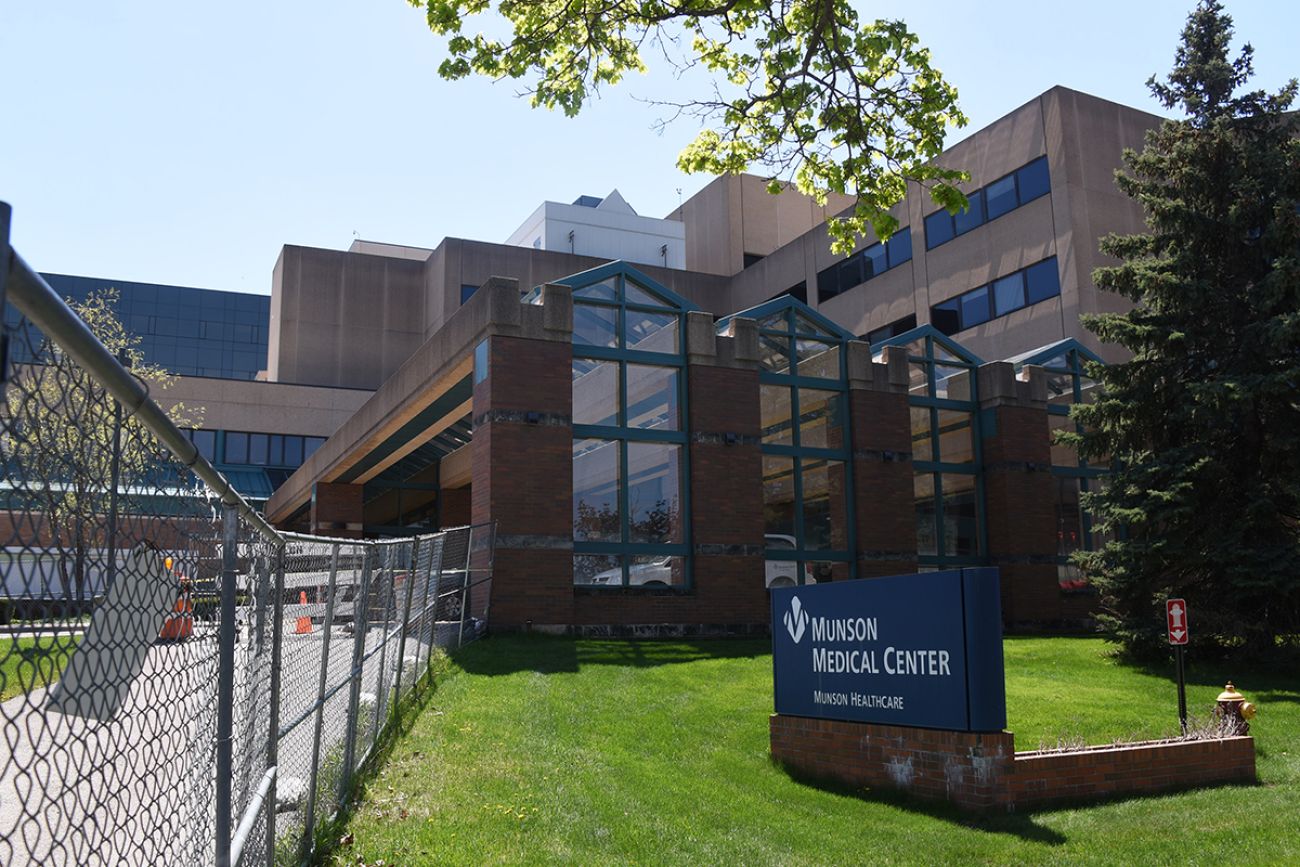Munson to trim inpatient services at rural northern Michigan hospitals

- Munson Healthcare is reducing inpatient services in more rural areas, boosting services at its hospital in Traverse City
- Hospital officials cited staff and financial concerns and more emphasis on virtual visits
- Some staff may have to shift workplaces, but they will have ‘options,’ given the shortage of workers
Munson Healthcare, northern Michigan’s largest employer, is rearranging patient care — boosting options at its larger hospitals, but winnowing inpatient care at others — as it faces deep staffing shortages, stalled reimbursement rates and what it said are changes in patient expectations.
The goal? Convince northern Michigan patients to remain at the eight-hospital system for complex care, rather than heading south to other hospital systems.
“We need to have a seamless experience as patients navigate the broader system,” Ed Ness, Munson Healthcare president and CEO, said at a call with reporters Wednesday morning.
“And we need to make sure that Munson Medical Center in Traverse City has an elevated level of care throughout the region, so patients don't have to go downstate — that they can stay in northern Michigan for the care that they need.”
Related:
- Will raffles, pig roasts and same-day pay ease the health worker shortage?
- Michigan ambulance workers still in short supply despite state grants
- Help wanted: Report ranks Michigan health care jobs with the most need
- Michigan health centers need medical staff. How one program is helping
The announcement comes as health providers across Michigan say they face staffing shortages that can threaten patient care, longer wait times in doctors’ offices and emergency rooms and — according to the Michigan Health & Hospital Association — the shutdown of more than 1,700 hospital beds in recent years. Existing shortages were exacerbated by the pandemic as more residents reached retirement age and younger people flee the state.

Munson’s three-year plan will boost services at the system’s Munson Medical Center in Traverse City, northern Michigan’s Level 2 Trauma Center and specialty care referral hospital.
But the plan will limit inpatient options in outlying, smaller sites, while consolidating inpatient beds at the Traverse City facility along with Otsego Memorial Hospital in Gaylord and Cadillac Hospital.
Full emergency services will remain at all of Munson’s eight hospitals which, in addition to Traverse City, are located throughout northwest Michigan.
- In Munson’s central region, the 442-bed Munson Medical Center in Traverse City will provide high-level special care, including the round-the-clock ability to treat complex conditions, and it will “continue to evolve” its neonatal intensive care unit, critical care options and cardiology services.
- In Munson’s east region: Otsego Memorial Hospital will become a regional hospital, adding inpatient beds to admit patients from smaller hospitals such as Charlevoix and Grayling.
In turn, the Charlevoix and Grayling facilities will limit inpatient beds, shifting their focus to outpatient services. Some patients may remain in “observation” units for short periods of time — a unit which is “in-between” emergency care and admissions. Here, doctors can assess patients’ conditions to determine whether to discharge them or admit them to the regional hospital.
- In Munson’s south region, Cadillac Hospital becomes the regional hospital, admitting patients from smaller hospitals such as Manistee Hospital and Paul Oliver Memorial Hospital in western Michigan’s Frankfurt. Cadillac has capacity to place transfer patients within its existing inpatient bed space, according to Munson spokesperson Megan Brown.
In turn, Manistee and Paul Oliver become community hospitals, and severely limit inpatient beds to focus on outpatient services. Already, both have limited admissions. Recent average patient counts show just a single patient on any given day at Paul Oliver and about nine at Manistee, Laura Glenn, Munson’s chief operating officer said.
Surgeries at Manistee would shift to Cadillac.
- Munson, system leaders said Wednesday, will add more primary care doctors and more options for telehealth. The plan also calls for renovations at some sites as well as equipment purchases, such as 3D mammography in more sites, Glenn said.
Kalkaska Memorial Health Center, an affiliate hospital, will remain a community hospital, Ness told Bridge Michigan after the press call.
The changes eventually will require some patients to drive further for care. For example, the Grayling hospital will close down its obstetrics delivery service in two years, forcing moms-to-be who typically would deliver their babies at Grayling to drive 29 miles to an updated, regional birthing center at Otsego Memorial Hospital in Gaylord.
Grayling would still offer prenatal care before delivery, she said: The plan “changed where you would deliver your baby, with that regional birthing center.”
For the time being, Glenn noted, Grayling will continue to deliver babies “while we work through the renovations necessary to really establish that regional birthing center (at Otsego Memorial Hospital) in Gaylord.”
Serving patients from 29 counties in northern Michigan, Munson employs about 7,500 people, but currently faces about 700 open positions “across disciplines.” About 30 percent of those openings are for nurses, said Glenn, the COO, noting openings, too, for radiology technicians, nursing assistants as well as environmental services and dietary staff.
The changes mean some staff will have new workplaces, but given the high number of openings, those staff will have “options,” she said.
Beyond staffing woes, there are other reasons for the three-year plan, during the press call, both Ness and Glenn told reporters.
Insurance reimbursements to hospitals, Ness said, have not kept pace with rising staff, equipment and drug costs.
That has “created unprecedented financial pressures in the healthcare industry as a whole and we're not immune to that,” he said. “Bottom line is (that) we need to change as our environment changes.”
And health care, in general, is shifting from inpatient beds to outpatient care at primary care offices, urgent care centers and long-term care facilities, for example. Patients expect convenient care, including virtual care options, and they want more primary care, Ness and Glenn said.
And they sought to stress that Munson isn’t eliminating options, rather consolidating inpatient care to expand outpatient care.
“What our communities need is more and better access to outpatient care,” Ness told Bridge Michigan after the press call. “By doing this regionalization of inpatient care, it allows us to invest in that expansion of outpatient care.”
The changes will allow for more timely appointments for annual physicals, primary care and urgent care, according to Munson's announcement.
“Implementing this plan allows us to preserve local health care and keep our hospitals open at a time when community hospitals across the country are closing,” Glenn said, during the press call.
Michigan workers vacancies
In this occasional series, we examine the scope of critical worker shortages in 2023, from doctors and police officers to math teachers and social workers. To view more stories in this series click here.
See what new members are saying about why they donated to Bridge Michigan:
- “In order for this information to be accurate and unbiased it must be underwritten by its readers, not by special interests.” - Larry S.
- “Not many other media sources report on the topics Bridge does.” - Susan B.
- “Your journalism is outstanding and rare these days.” - Mark S.
If you want to ensure the future of nonpartisan, nonprofit Michigan journalism, please become a member today. You, too, will be asked why you donated and maybe we'll feature your quote next time!





